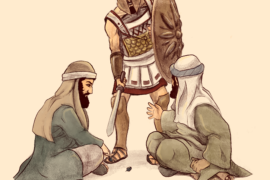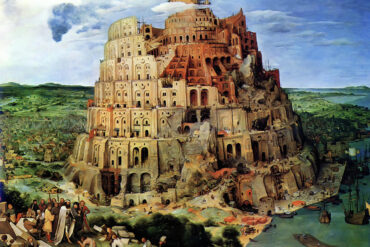What can the dynamics between Yitzḥak and Yishmael in Parshat Vayeira teach us about Israel’s ideal relationship with the Muslim world?
What mistake from Avraham’s past contributed to the destruction of the city of S’dom?
For more content from VISION Magazine, subscribe to our newsletter and follow us on Twitter @VISION_Mag_, Facebook and YouTube. If you haven’t already, don’t forget to subscribe to our podcast on SoundCloud, iTunes, Stitcher, TuneIn, or Spotify and leave a rating and review to help us get our message out to a wider audience!
To support the podcast, head over to our PayPal portal and be sure to write a note that your contribution is for the podcast.
Hosted by: Yehuda HaKohen
Transcript:
Parshat Vayeira continues the story of Avraham on his his journey to becoming the progenitor of the nation of Israel. But it specifically focuses on his internal struggle with limiting and refining his own attribute of ḥesed.
Without getting too deep into this, it’s helpful to understand that from a Kabalistic perspective, there are ten s’firot – ten attributes, or emanations – through which the Creator reveals Himself and continuously creates both our physical world and the chain of higher metaphysical worlds.
One of these s’firot is called ḥesed, which essentially means kindness or benevolence. It’s the unbounded loving-kindness with which the Creator created the world and with which all of Creation is permeated.
But since HaShem’s infinite and unlimited ḥesed is intended for finite creatures unable to absorb infinite kindness while still remaining in physical existence, the attribute of ḥesed is meant to be limited and controlled by the s’fira of g’vura.
G’vura means restrictive power, the power to limit and conceal the infinite Divine light so that each creature in Creation can receive that Divine light according to its own capacity.
Therefore, g’vura should also be understood as an aspect of Divine kindness, because if the outpouring of infinite ḥesed were to remain unrestricted, finite creatures would essentially be nullified. So the s’fira of g’vura is the manifestation of Divine power to restrict and conceal HaShem’s light so that His creatures can receive His ḥesed – His loving-kindness – according to each of our personal capacities.
Now when it comes to human beings displaying these attributes in their personalities and actions, the s’fira of ḥesed manifests itself as the desires to give, to share and to show mercy. These are obviously positive drives that benefit society but if they were to go completely unchecked and not be restricted by any limitations, society would likely collapse. Ḥesed therefore requires some level of restriction. And this was very much Avraham’s central challenge as he grew in his mission. He had to learn to limit and refine his own dominant attribute of ḥesed, which he ultimately did through a series of tests and his relationships with his wife Sarah and son Yitzḥak, both of whom represented the attribute of g’vura.
The parsha opens with three malakhim (often translated into English as “angels”) visiting and informing Avraham that his wife Sarah will give birth to a son. Like his mother, this son – Yitzḥak – will exemplify the Divine emanation of g’vura – which manifests itself as strength, discipline and an inclination towards strict justice, setting boundaries, self-restraint and law in the service of preserving tradition and social order. Both Sarah and Yitzḥak, as bearers of this attribute within the structural framework of establishing the Hebrew nation, devoted themselves to maintaining, protecting and preserving the teachings and mission of Avraham.
This posed somewhat of a challenge for Avraham and was very central to his own evolution in recognizing the value of g’vura and the need for integrating and balancing it with his ḥesed.
At first, when they were childless, Avraham and Sarah were very successful at spreading their teachings to many followers from Babylon to Egypt. But the more Avraham internalized HaShem’s message that his mission would have to be achieved not through a universal religion but actually through a unique holy nation, the more he began to experience a crisis due to his own lack of children.
Sarah resorted to extreme measures by instructing Avraham to take her servant Hagar as a wife so that he could father children with her.
From one perspective, we can see this as an act of desperation with very serious consequences that stemmed from a lack of trust in HaShem’s plan. But from another perspective, we can say that Avraham needed to father and raise a child in order to prepare himself – in order to become who he would need to be in order to father a son with Sarah that would continue his mission.
In any event, Avraham went along with Sarah’s plan and fathered Yishmael with Hagar. And what we see is that Avraham felt very attached to Yishmael for two reasons. Number one, Yishmael was very much a copy of Avraham, in that he also very strongly manifested the attribute of ḥesed. And number two, because Hagar – as a princess of Egypt – represented Egyptian civilization. Avraham saw his creating a son together with Hagar as validation for his previous mission of a universal religion. A son that’s half Hebrew and half Egyptian royalty could potentially help influence the mighty Egyptian kingdom to incorporate and spread many of Avraham’s spiritual teachings.
Yishmael would in fact go on to continue Avraham’s early work. His descendants will create a universal religion called Islam. And just as Yishmael is characterized by unrefined ḥesed, the Islamic religion will serve to restrict and balance this attribute by strongly emphasizing g’vura.
The ideal relationship between the nation of Israel and the Muslim world should be established on the foundation of both parties continuing Avraham’s work. Israel is meant to be the unique holy nation that expresses the Divine Ideal in all spheres of national existence while Islam should serve as the Noaḥide religion for righteous gentiles. This partnership should of course be the basis of any healthy Jewish-Muslim dialogue. But it requires that the Islamic world first recognize Israel for what we are.
Recognizing Israel – or more specifically recognizing Yitzḥak – was something very difficult for Yishmael to do because Yitzḥak’s birth created a serious crisis for him. Yishmael was 14-years-old when Yitzḥak was born. Until then he was Avraham’s only son and presumed heir. Once Yitzḥak was born, Yishmael was displaced and his entire status changed. But despite this, Yishmael was eventually able to recognize Yitzḥak, once Yitzḥak demonstrated that he’s truly Avraham’s rightful heir.
In order to correct our relationship with the Islamic world today, Israel must first and foremost behave as Israel is meant to behave, in a way that expresses the values and worldview of our patriarch Avraham, in order to make it easier for Muslims to recognize who we truly are and what we represent. Only then can Israel achieve true peace and establish a unique partnership with our neighbors on the basis of not only our regional interests but also a shared universal vision for humanity.
In any case, Avraham had many disciples, most notably Lot, Eliezer and Yishmael. But his primary partner was always his wife Sarah. Sarah’s role is very important to their partnership because her g’vura often served as a correction for Avraham’s ḥesed.
In general, Avraham strove for universality. And it was often Sarah who redirected Avraham to the specific task of creating the Hebrew nation. Sarah was the force that set boundaries and kept her husband focused on the primary objective of creating Israel.
So while Avraham might have viewed nationalism as antithetical to universalism, HaShem continued to push him towards a revolutionary nationalism that aspires to universalism. Meaning that for Avraham to become truly universal, he had to first create a nation that would achieve its national potential and only then could it give what it has offer to the rest of the world.
The fact that the ideas they were spreading could best find their way to the rest of humanity through the creation of a unique people to transmit them was far easier for Sarah to appreciate than for Avraham. She understood that the foundation of universalism couldn’t be cosmopolitanism but actually the realization of one’s own national fulfillment.
In his commentary on B’reishit 21, verse 12, Rashi quotes our Sages in the beginning of Shmot Rabbah and teaches us that Sarah had greater nevua – a higher level of prophecy – than Avraham.
We also see an indication that it was Avraham and not Sarah who was the cause of their infertility, because it was he who was lacking the necessary spiritual growth to produce Yitzḥak. That doesn’t mean Avraham was unable to father children. He was clearly able to produce a son with Hagar, which likely strengthened Sarah’s feeling that she was responsible for their infertility. But just because Avraham was able to father children didn’t mean he was able to produce Yitzḥak. He wasn’t yet ready to create with his Hebrew prophetess wife the successor who would continue building the Hebrew nation.
The different levels of Avraham and Sarah also find expression in the different manner in which their names were changed at the end of Parshat Lekh Lekha. We see this difference in the wording of how their names change in B’reishit chapter 17.
Verse 5 says about Avraham “And your name shall no longer be called Avram, but Your name shall be Avraham” but verse 15 says about Sarah “do not call her name Sarai, for Sarah is her name.”
Meaning that Avraham received a new name to accompany his success in overcoming certain deficiencies and attaining a new spiritual level. Now he could finally father Yitzḥak. But Sarah wasn’t given a new name – rather her true name, which had until then not been revealed, is finally being revealed to Avraham. In order to bear Yitzḥak, Sarah needed Avraham to see what had been hidden inside her all along.
One of the things we actually see Avraham correcting on his journey is his orientation toward Sarah, as well as his attitude towards the attribute of g’vura. Twice we see Avraham calling Sarah his sister. Once in Egypt and once in Grar. The truth is that she was his sister – or more precisely, his half brother’s daughter. And she was also his partner in his life’s work. He may have seen her more as a comrade than as a wife. He may have seen her purpose more as helping him educate disciples than as helping him to raise a family and produce a nation. In such a case, it might have actually a felt a bit natural for him to call her his sister. But once he actually told Avimelekh his rationale, once he explained it out loud, he may have been forced to internalize the fact that she really was his wife – and his primary wife. This recognition for what Sarah had always been was likely a crucial point in the spiritual advancement Avraham needed in order to facilitate Yitzḥak’s birth.
Part of what had blocked Avraham from truly seeing Sarah until then was her attribute of g’vura, which he had to learn to appreciate. Most people tend to generally see their own inclinations and their own views as the most true and beneficial for the world. This is actually natural and to a certain extent healthy and necessary because HaShem creates each of us a certain way for a certain purpose and even when we’re able to recognize the validity and value of opposing tendencies and ideas, it’s still important that we fight for our own in order to actualize our purpose in this world.
But it’s dangerous for someone to become such a fanatical supporter of any idea that he believes it to be the only solution for all humanity’s problems. Even when the idea is true and an important component of what’s necessary to advance the world, it shouldn’t be given absolute value to the exclusion of other ideas.
The higher level of awareness would lead such a person to continue actively supporting that idea, while at the same time allowing him to see it as only one piece of the overall puzzle. Abraham’s eventual transition from total preoccupation with ḥesed to internalizing the importance of harmonizing ḥesed with g’vura not only cleansed our national roots of fanaticism but also allowed for Avraham to develop healthy relationships with Sarah and Yitzḥak.
In any case, when the visiting malakhim informed Avraham that Sarah will give birth to a boy in a year’s time, we see something very strange in the text. Sarah was listening to the conversation from the entrance of the tent. We’re told that both she and Avraham were old and that her body was no longer capable of having children. So she laughs, saying in B’reishit chapter 18, verse 12: “After I have withered shall I again have delicate skin? And my Lord is old.”
Then the Creator Himself asks Avraham – who presumably hadn’t heard her – why Sarah laughed. And then after being called out, Sarah denies having laughed. So what’s this really about?
Most people tend to interpret Sarah’s words to be saying that bearing a child is impossible because she and Avraham are both too old. But this requires us to translate “Va’Adoni Zaken” as “my husband is old” when the word “adoni” doesn’t literally mean “my husband.” It means “my lord.” Perhaps Sarah wasn’t calling Avraham old but actually calling HaShem old.
In referring to the Creator’s “old age” Sarah meant to say that He no longer interferes with the natural flow of events. That He created the world and set the laws of nature in motion but doesn’t get involved in such a way that breaks these laws. This is a perspective of g’vura on its own. There are rules and those rules must be preserved.
I think this understanding actually corresponds better to HaShem’s answer: Instead of addressing Avraham’s purported old age, HaShem says in verse 14: “Is anything too wondrous for HaShem?”
Also, if we understand Sarah to be speaking of HaShem’s “old age,” her phrasing might actually becomes more logical. We could interpret her words as saying: “I myself have already grown old, and the Creator, too, no longer intervenes in the world. Everything that happens now follows the immutable laws of nature and therefore I shouldn’t expect give birth.”
This attitude actually expresses Sarah’s deeper problem. Since the desire to uphold and observe laws, including the laws of nature, is a central quality of g’vura, Sarah’s words were very much a deep expression of g’vura.
It’s important to understand that the attribute of ḥesed isn’t just kindness, but also a revolutionary desire to improve the world by changing the status quo. Avraham didn’t just give inspirational speeches. He smashed idols. And the attribute of g’vura isn’t just about justice and discipline, but also a strong desire to preserve and protect the social order.
Avraham was ḥesed, and Sarah, as a member of Avraham’s family, was “the g’vura within ḥesed.” When they acted in partnership against the outside world, Avraham and Sarah together did ḥesed and successfully influenced many people to embrace the Hebrew worldview of ethical panentheism. But in their internal relationship within the family, Sarah’s attribute was g’vura, which made it difficult for her to accept that HaShem would alter the laws of nature for her.
Not because she thought the Creator couldn’t alter the laws of nature. She knew He could. But she didn’t think it was necessary. HaShem called her out at this point, not to take her to task but in order to challenge her understanding of how the universe functions and to help her to achieve her needed spiritual advancement through the refinement of her attribute of g’vura.
The refinement for g’vura actually comes through laughter. And this is why Sarah would name her son Yitzḥak – which means “he will laugh.” Laughter is necessary to correct the attribute of g’vura. People of g’vura need to develop the ability to laugh at the world. To laugh at themselves and even at the ideas and values they fight for.
So Sarah’s laughter when hearing that she would bear a son didn’t actually imply a rejection of the prophecy she heard. Rather she was sensing within herself the possibility of a spiritual breakthrough. But at the conscious level, she couldn’t yet fully accept the prophecy, because she knew that from a physiological perspective, she couldn’t give birth.
Just as Avraham’s spiritual development required him to limit his attribute of ḥesed, Sarah’s development required her to limit her attribute of g’vura. While her laughter at the prophecy might’ve actually been an expression of her subconscious joy, her reaction was to deny that she had laughed. Verse 15 states she was afraid. But she probably wasn’t afraid of being punished for laughing. What’s more likely is that she was afraid to admit to herself that she had laughed – afraid to admit to herself that she believed in any possibility of an illogical break in the laws of nature. She likely feared the collapse of her perception of the world. And was therefore afraid to acknowledge her own laughter.
From this perspective, HaShem called her out in order to help her to overcome her fear of her own laughter, so she could confront it and grow from it. He wanted her to accept the possibility of change so she could successfully advance. So after she denied having laughed, He said “No, you did laugh!”
We see this dialogue continuing when the Torah tells us of Yitzḥak’s birth in B’reishit chapter 21. In verse 6, Sarah said “Elokim has made laughter for me, whoever hears will laugh for me.” By this point, Sarah was able to accept the notion of miracles overcoming the laws of nature and she was therefore no longer ashamed or afraid of having laughed.
If we go back to the visit of the three malakhim, there’s something else worth mentioning about the event. After being informed that he and Sarah would have a son, Avraham was told that the city of S’dom was about to be destroyed. This led to a very unusual discussion between Avraham and the Creator in which Avraham made a passionate argument for the city to be spared – despite the fact that S’dom personified the antithesis of Avraham’s values and teachings.
Above and beyond the fact that Avraham generally championed the value of ḥesed and had still not figured out how to integrate ḥesed with g’vura, there might be another motivation for Avraham’s defense of S’dom. Guilt.
On some level, it can be argued that Avraham bore some responsibility for S’dom’s destruction. During his war against the four most powerful world empires in B’reishit chapter 14, Avraham and his disciples became a recognized military power. He could have easily taken control of the country in order to establish a kingdom that would enforce his values. But he didn’t because he wasn’t comfortable with using power or welding authority. And as a result, S’dom continued on its path and was ultimately destroyed. This may have been both a deep personal tragedy and and wake up call for Avraham, leading to an appreciation for integrating g’vura into his ḥesed.





